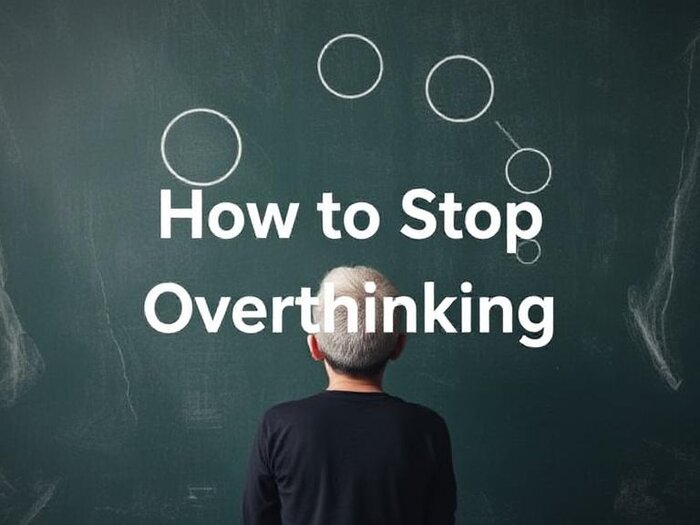Have you ever found yourself lying awake at night, replaying a conversation over and over in your head? Or worrying about something that hasn’t even happened yet — and might never happen at all? Yep, that’s the classic cycle of overthinking — and you’re not alone.
Overthinking is one of the biggest causes of anxiety and emotional fatigue in today’s fast-paced world. It’s like your brain opens 47 tabs and refuses to close any of them. But the good news is: you can break the cycle.
In this guide, we’ll walk you through how to stop overthinking in simple, practical steps. You don’t need fancy techniques or expensive therapy (though that can help too). You just need the right mindset and some go-to tools you can use every day.
What Is Overthinking, Really?
Overthinking is the process of dwelling excessively on your thoughts, problems, decisions, or past events. It can take two main forms:
1. Ruminating
Thinking obsessively about the past:
“Why did I say that in the meeting? What if they think I’m stupid?”
2. Worrying
Obsessing over the future:
“What if I fail this test? What if they leave me? What if I never figure it out?”
Either way, it keeps you stuck — not solving problems, just spinning in circles.
Why Overthinking Is a Problem
You might think you’re being thorough or responsible, but overthinking doesn’t equal problem-solving. In fact, it often:
- Leads to indecision and procrastination
- Increases stress and anxiety
- Disrupts sleep
- Harms self-esteem
- Hurts relationships

How to Stop Overthinking: 10 Simple Steps
1. Catch Yourself in the Act
The first step to stopping overthinking is to notice when it’s happening. Awareness is half the battle.
Try this:
Pause and ask yourself:
“Am I problem-solving right now, or just looping in my head?”
Once you recognize the pattern, you can begin to shift it.
2. Do a Brain Dump
Get those thoughts out of your head and onto paper. Writing them down makes them feel less overwhelming and more manageable.
How-to:
- Grab a notebook or use a note app
- Set a timer for 5 minutes
- Write everything you’re overthinking — no judgment, no editing
Bonus Tip: End your brain dump with one positive affirmation or intention for the day.
3. Set a Worry Timer
If your brain really wants to overthink, let it — just on your terms.
Try this technique:
- Set a timer for 10–15 minutes
- Give yourself full permission to worry or obsess
- When time’s up, close the mental door and move on
This prevents overthinking from leaking into your entire day.
4. Move Your Body
Physical movement can help quiet a busy mind. When you move, you disrupt your thought patterns and reconnect with the present.
Options:
- Take a walk outside
- Do a quick stretch or dance to a favorite song
- Try yoga or breathing exercises
Real-World Example:
Sarah, a college student, found that walking while listening to calming music reduced her spirals by half.
5. Talk It Out (But Not Endlessly)
Sometimes we just need to say it out loud. Call a friend, talk to your partner, or see a therapist — just be mindful not to vent on repeat.
Healthy Talk Guidelines:
- Ask, “Do you have space to hear me out?”
- Keep it under 10 minutes
- Focus on solutions, not just rants
Read Also: Calming Rituals to Try Before Bedtime for Better Sleep
6. Limit Information Overload
Too much content, news, or social media can overstimulate your mind and trigger overthinking.
Try This:
- Unfollow anxiety-triggering accounts
- Avoid doomscrolling before bed
- Set daily screen time limits
Mindset Shift: Not every alert deserves your attention — your peace of mind is more important.
7. Practice Mindfulness (In Small Doses)
You don’t need to meditate for an hour to be mindful. Just practice being present — even for 60 seconds at a time.
Micro Mindfulness Ideas:
- Focus on your breath for 1 minute
- Pay attention while sipping your coffee
- Watch clouds without judging your thoughts
Apps That Help:
- Insight Timer
- Headspace
- Calm
Read Also: Why a Walking Meditation App Might Be the Easiest Way to Start Meditating
8. Make a Decision and Stick to It
Indecision feeds overthinking. The antidote? Make the best decision you can — then move on.
How to Decide:
- Ask: What’s the worst-case scenario? Can I live with it?
- Set a deadline for deciding
- Remind yourself: No choice is perfect — just progress
Quote to Remember:
“You don’t need to see the whole staircase, just take the first step.” – Martin Luther King Jr.
9. Establish Daily Mental Hygiene
Just like brushing your teeth, mental clarity needs daily maintenance.
Build a routine:
- Morning journaling or gratitude list
- Midday stretch + breathwork
- Evening screen break + quiet time
Mini Mantra:
“I am not my thoughts. I can choose which ones I follow.”
10. Challenge Negative Thinking Patterns
Overthinking thrives on “what ifs,” catastrophizing, and self-doubt. Fight back with facts and compassion.
Try This Reframe:
- “What if I fail?” → “What if I succeed?”
- “I always mess up” → “I’ve learned from past mistakes.”
- “Everyone will judge me” → “Most people are focused on themselves.”
Remember: You’re allowed to rewire your narrative.
FAQs About Overthinking
Q: Is overthinking a mental health issue?
A: It’s not a disorder itself, but chronic overthinking is often linked to anxiety, stress, or depression. It’s worth exploring with a mental health professional.
Q: Can overthinking be cured?
A: You may not eliminate it completely, but with practice and self-awareness, you can manage and drastically reduce it.
Q: How do I stop overthinking at night?
A: Try journaling before bed, avoiding screens after 9 PM, doing deep breathing, or listening to a guided meditation to calm the mind.
Final Thoughts: You Are Not Your Thoughts
Overthinking can feel like a trap — but the exit is always available. With simple daily practices, self-awareness, and a bit of patience, you can retrain your mind to focus on what matters now — not what could go wrong tomorrow.
Start small. Be kind to yourself. Celebrate progress.


